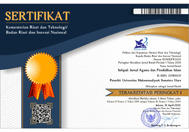Perbedaan Hasil Belajar Pada Mata Pelajaran Pendidikan Agama Islam (PAI) Berdasarkan Keaktifan belajar Siswa Kelas X SMA Swasta Al-Hidayah Medan.
Abstract
This research aims to a. know the learning outcomes on the subjects of Islamic Religious Education (PAI) based on the liveliness of class X students of SMA Al-Hidayah Medan. b. knowing the learning outcomes in the subjects of Islamic Religious Education (PAI) based on inactivity of students of class X SMA Al-Hidayah Medan. c. know the difference of learning result on the subjects of Islamic Religious Education (PAI) based on the activity and inactivity of the students of grade X SMA Al-Hidayah Medan. This research is quantitative research, population in this research amount to 120 student of class X SMA Al-Hidayah Medan. While 60 people using cluster random sampling. The result of hypothesis test shows that: 1. The result of student learning that actively follow religious learning activity is high, with the average value of student learning is 7.45, while the learning result of students who are not actively follow the learning activity of religion is enough, average 6.05. 2. There are differences in student learning outcomes that actively participate in learning activities with those who are not actively participating in religious learning activities. This is evident from the results of the hypothesis calculation is > or 1.92 > 1.66 at a significant level of 5% (0.05). 3. The difference of religious learning outcomes of active students with inactive indicates that teacher role is very important to find solution to improve student learning result especially for those who are not active follow religion subject.
Keywords
Full Text:
PDF (Bahasa Indonesia)References
Ahmadi, Abu. (1997). Psikologi Belajar, Jakarta: Rineka Cipta.
Arifin M. (1998). Hubungan Timbal Balik Pendidikan Agama di Lingkungan Sekolah dan Keluarga, Jakarta: Bulan Bintang.
Aziz Rambe Abdul. (1998). Sumbangan Pendidikan Islam Dalam Pembangunan Nasional, Medan: Toha Putra.
Hafsah. (2006). Ilmu Fiqh, Medan: PT. Madju. Medan.
Hasan Chalidjah. (1999). Dimensi-Dimensi Psikologi Pendidikan, Surabaya: Al-Ikhlas.
Irwan Nst, Syafaruddin. (2005). Manajemen Pembelajaran, Jakarta: Quantum Teaching Press.
Mansyur. (1991). Strategi Belajar Mengajar, Jakarta: Bumi Putra.
Mulyasa, E. (2006). Kurikulum Tingkat Satuan Pendidikan, Bandung: Remaja Rosdakarya.
Purwanto, M. Ngalim. (1997). Psikologi Pendidikan, Jakarta: Remaja Karya.
Rohani HM Ahmad, Abu Ahmadi. (1996). Pengelolaan Pengajaran, Jakarta: Rineka Cipta.
Sabri, A. (2005). Strategi Belajar Mengajar dan Mikri Teaching, Jakarta: Quantum Teaching.
Sastrapradja, M. (1997). Kamus Istilah Pendidikan dan Umum, Surabaya: Usaha Nasional.
Suryabrata, Sumardi. (1997). Psikologi Pendidikan, Jakarta: Raja Grafindo Persada.
Tilaar, AR. (1996). Pendidikan Non Formal Sebagai Ide Eksplosif dalam Pendidikan, Jakarta: Konvensi Nasional.
Uzer, Usman Moh. (1995). Menjadi Guru Profesional, Bandung: Remaja Rosdakarya.
Widodo Supriyono, Abu Ahmadi. (1991). Psikologi Belajar, Jakarta: Rineka Cipta.
DOI: https://doi.org/10.30596/intiqad.v11i1.2019
Refbacks
- There are currently no refbacks.
Intiqad Jurnal Agama dan Pendidikan Islam is abstracting & indexing in the following databases:
View My StatsEditorial Address:
Faculty of Islamic Religion, Universitas Muhammadiyah Sumatera Utara. Jl. Mukhtar Basri No. 3 Medan 20238 Telp. (061) 6622400 ext. 27 dan 28 Fax. (061) 6625474. e-mail: intiqad@umsu.ac.id

_(1).png)























